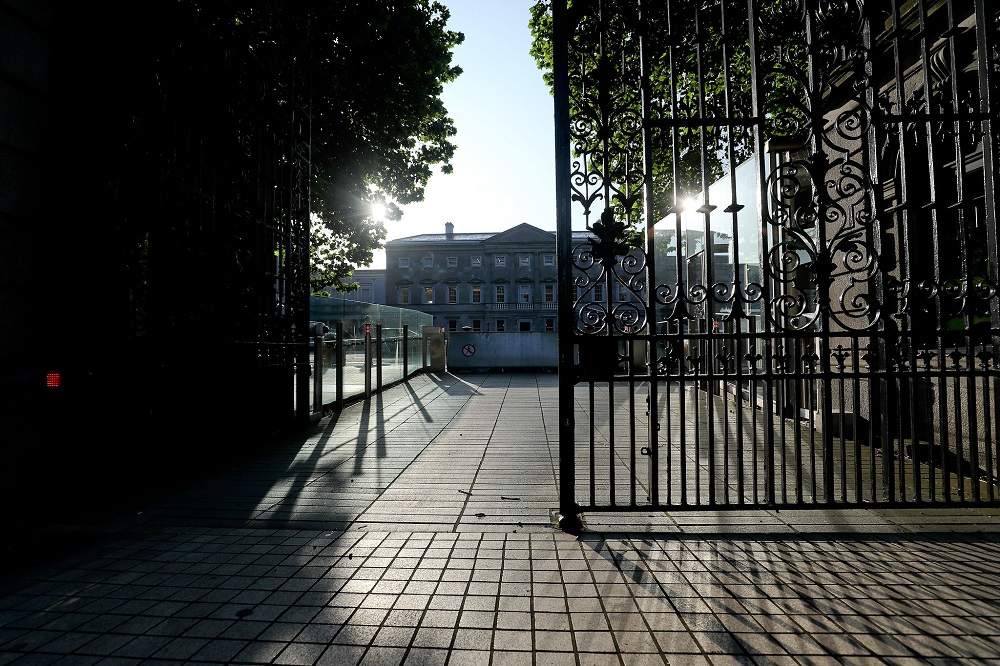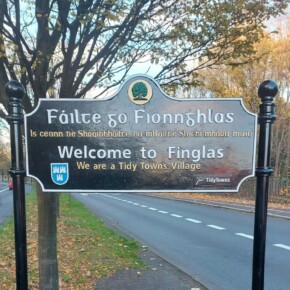Probation for man who rammed Leinster House and Aras An Uachtaráin gates
Dublin People 06 May 2025
By Eimear Dodd
A judge has warned a man who was suffering from a paranoid delusion when he rammed gates at Leinster House and Aras An Uachtaráin last year that he will end up in prison if he repeats his offending.
David O’Callaghan (41) of the Fairways, Woodbrook Glen, Bray, Co Wicklow, caused over €60,000 worth of damage after he drove at gates at Leinster House, Custom House and Aras An Uachtaráin, Dublin Circuit Criminal Court previously heard.
O’Callaghan pleaded guilty to driving into the rear gates of Leinster House and two counts of criminal damage, all on August 2 last.
He told gardai that a person he believed to be his father was “spiking” and spraying poison in his food and room. He said he had been communicating with President Michael D Higgins about this and decided to crash into the gates to stop it himself.
O’Callaghan said he didn’t want to get inside, only cause damage. He has since been diagnosed with schizophrenia and is receiving treatment.
O’Callaghan has 11 previous convictions, including for drug offences.
After hearing facts last month, Judge Martin Nolan directed the Probation Service to comply conditions for the supervision of O’Callaghan.
Judge Nolan imposed a four-year prison sentence, which he suspended on strict conditions including that O’Callaghan place himself under the supervision of the Probation Services for 21 months.
The judge told O’Callaghan: “You have to do what they [the Probation Service] tell you to do.”
“You’re getting a chance, principally by reason of your underlying problems, but any repeat and you will end up in prison,” the judge said, adding that O’Callaghan would be brought back before the court if he offended during the term of the suspended sentence.
Garda Niamh McCarthy previously told Oisin Clarke BL, prosecuting, that O’Callaghan drove a white Ford Transit van to Chesterfield Avenue, then did a sweeping u-turn in front of the entrance gates of Aras An Uachtaráin before reversing into them and breaching them, before driving away.
The gates were inoperable for a period of time after this incident, with repairs costing €4,795.
O’Callaghan then drove to the Customs House, where he drove into gates, reversed out, then turned and reversed in for a second time.
The court heard the gates were not forced open the first time he hit them, but after he reversed into them. Approximately €2,000 worth of damage was caused.
A few minutes later, a garda on duty at the rear of Leinster House heard a loud crash, then metal hitting the ground. He saw a vehicle reversing from the gates towards Merrion Street Upper.
A short time later, the garda heard two further crashes and then noticed a van stopped near the Department of the Taoiseach and that a set of gates at the Ministers’ Entrance were off the hinges.
O’Callaghan damaged three sets of gates at the rear of Leinster House in quick succession at around 2.30am.
The first gate was not fully breached after O’Callaghan drove straight into it due to the anti-ram protection in place.
He then reversed at speed into the gate known as the Minsters’ Entrance, knocking it from its hinges. One of the gates collided with an usher’s hut, smashing a window.
The court heard that O’Callaghan struck the perimeter gate at the Department of the Taoiseach with such force that the airbags deployed and the van was inoperable afterwards.
O’Callaghan then got out of the van and appeared to be drinking from something. It also looked like he had his phone and was recording, the court heard.
Over €52,000 damage was caused to the gates at Leinster House.
He told gardai at the scene that he had been driving the van and he admitted crashing into the gates at Leinster House, Customs House and Aras an Uachtaráin.
He also told gardai that he had consumed alcohol and cocaine earlier that evening.
After his arrest, O’Callaghan told gardai he had reversed into a vehicle parked in the forecourt of Windsor Motors, Bray, Co. Wicklow before he drove to Aras An Uachtaráin. The court was told that extensive damage was caused to the vehicle.
In total, €60,000 worth of damage was caused, not including the damage to the vehicle in the forecourt.
O’Callaghan was arrested and was initially deemed unfit for interview. When he was later interviewed, he said he “just lost the head and felt highly psychotic”.
Gda McCarthy told the court that O’Callaghan was cooperative with gardai and entered an early guilty plea.
She agreed with John Berry SC, defending, that emails were found on O’Callaghan’s phone, which indicated he had a paranoid delusion that his food had been spiked and he had been poisoned for three years.
It was further accepted that after O’Callaghan was charged, gardai objected to bail. He was assessed by Cloverhill Prison’s psychological team and arrangements were made for him to be treated as an involuntary in-patient at a psychiatric facility in Dublin.
O’Callaghan was later granted bail in October, having spent three months in custody.
It was further accepted that O’Callaghan has agreed that information can be given to gardai if he stops his treatment or takes illicit substances, and gardai have been in recent contact with his father.
Mr Berry told the court his client had been emailing the President, adding that his client was not emailing the Taoiseach or the Minister for Housing.
Defence counsel said his client has a long work history, most recently as a kitchen porter.
He said it was unrealistic for his client to repay the cost of damages due to his low income. A number of reports were handed to the court along with a letter from O’Callaghan’s father.
Mr Berry asked the court to take into account his client’s psychiatric difficulties, which were aggravated by his voluntary abuse of illicit substances. Counsel outlined that the report indicates a treatment plan for his client with O’Callaghan’s father to contact the relevant services if his son relapses. He asked the court not to impose an immediate custodial sentence.
Judge Nolan previously noted that O’Callaghan would require supervision. He added that the Probation Service is “a State authority with statutory power”, noting that the court didn’t want to “place these burdens” of supervision on O’Callaghan’s father or psychiatric services.











